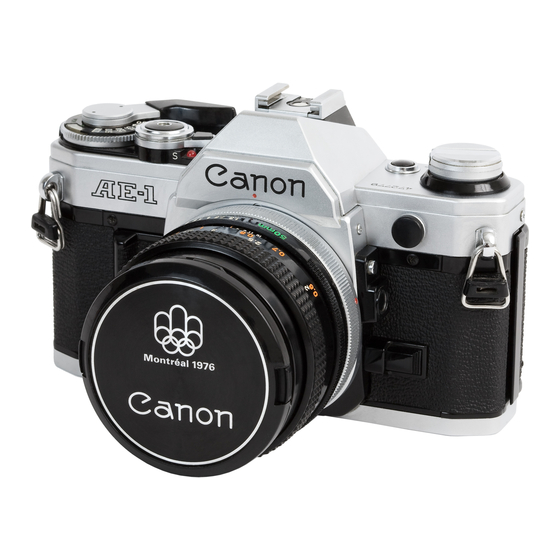Canon AE-1 Manuel - Page 4
Parcourez en ligne ou téléchargez le pdf Manuel pour {nom_de_la_catégorie} Canon AE-1. Canon AE-1 42 pages.
Également pour Canon AE-1 : Pour commencer (2 pages), Manuel d'instructions (22 pages), Manuel de procédures d'installation (48 pages), Manuel (12 pages), Manuel d'instructions (22 pages)

LSI digital circuit with extremely high properties of accumulation, an operational amplifier, a
circuit with full use of an analog switch, a hyperbolic function resistance using both thick and
thin film technology, an analog digital converter, and the proper interfaces, together with their
constructions and arrangements in modular form, represent the technological breakthroughs in
camera design and made mass production possible, which in turn, made photography more
affordable to the general consumers.
Exceptional Reliability through Application of Electronics The Canon AE-1, since it
employed computer technology and its overall design was based on electronics, opened the
doors to a new age in the camera world. In order to make an inter-related package out of all
the inner mechanisms and to automate the assembly process, each and every part must be built
with a very high degree of precision.
And Canon extensively used computers to
automate the design of the modules as well as the assembly, manufacturing and finishing
processes. In a way, the AE-1 has influenced (and inspired) many other manufacturers to look
into the application of plastic materials in camera manufacturing to reduce costs of
production. Although the Canon AE-1 has shinny metallic finishing and even sounds like a
metal when you used your finger to knock on its shell, in reality, it was a clever use of a
production technique with an underlying coating of Iron Oxide beneath the plastic which gave
it such a similar metallic feel. But the key essential parts like the lens mount, had used metal
as the prime material. But undeniably, the modular construction of the camera allowed
acceleration in its production with the more uniformed quality control..
Flexible Substrate of the
(integrated Injection Logic) High grade of LSI technique used. Equivalent to three
Canon AE-1
chips of IC consisting of more than 1,000 elements.
By using new production methods and the adoption of highly advanced packaging techniques
in the manufacture of electronics circuitry, the vital parts were completely sealed to keep out
dust and humidity and reduce the effects of temperature. The IC and resistance circuits were
built as units. Not only was the wiring streamlined to increase efficiency, but also the new
modular joints and all other main parts were completely sealed to obtain the best possible
weather proofing (but it was not a water proof camera).
Interface Interface as a common boundary of mechanics and electronics. Three magnets: 1)
For camera function start, 2) For AE aperture control, 3) For second shutter curtain control
were used to enhance reliability and precision which provides a matching precision assured by
